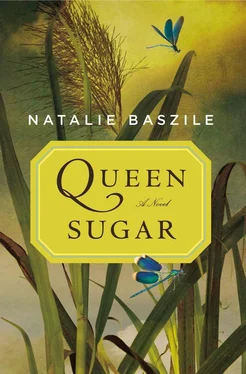“You work hard,” Romero said, offering Charley a length of cane.
Charley sucked the juice greedily and spat. “Where will you go after this?” The money Romero would make during these next four months was good, Charley thought, but it wouldn’t last all year.
“Arkansas to pick apples,” Romero said, “then home to my village. I have a small farm.”
Charley thought of all the men like Romero — Native Americans and indentured servants from Ireland and Germany, Chinese, West Indians, and former black slaves — who, through the centuries, had left their families and their homelands behind, sometimes voluntarily but sometimes not, to work sugarcane. “I hope you’ll come back next year.”
It wasn’t long before Huey Boy, pulling an empty wagon, appeared and made his way along the furrows. Groaning as they rose, Charley and the rest of the crew didn’t bother to dust off their jeans as they fell in line and the work began again.
• • •
By lunchtime, it was hotter than the Congo Basin, the air heavy with humidity, the few clouds flat against the sky, the trees at the edge of the field blurry through the heat rising from the field. Denton and Alison brought Charley’s lunch from the shop, and the three of them camped out in the tractor’s meager shade.
“I’m impressed,” Denton said. “I thought you’d quit after the first row.”
“My hat goes off to these guys,” Charley said. Normally, the heat lessened her appetite, but the hours of work had left her ravenous and slightly dizzy. “I don’t know how they do it.” She thought about the sick worker she’d driven to the clinic. Whatever he had, she hoped it only lasted twenty-four hours because she doubted she could keep up this pace much longer. Still, as Charley looked at the progress they’d made that morning, there was no denying the thrill of it, no ignoring the simple delicious fact that she had reached this stage in the game.
“Looks like your plan worked, Denton,” Alison said. Indeed, word of their pay package had spread. In addition to the men Denton had hired earlier in the summer, twenty-five more had stopped by the shop in the last week, interested in hiring on, and they’d had the rare luxury of handpicking the crews. “Keep up this pace, we’ll have the back quadrant planted in ten days. Even the locals are putting out a hundred percent.”
“What’s that supposed to mean?” Charley said, though she knew exactly what Alison was saying. She’d stopped counting the number of times she’d heard people refer to black folks as “locals,” and was weary of their suggestion, sometimes their outright declaration that black folks would rather sit home and collect welfare than put in an honest day’s work.
“Nothing personal,” Alison said.
“I get so tired—” Charley began, and thought, at least call them pioches , which was the term the eighteenth-century planters used in referring to their black slaves and more honestly captured the feeling of disdain, but Denton interrupted.
“Just heard on the radio they’re talking about a hurricane.”
Alison pushed his cigarette into the dirt. “Jesus, Denton. Why you want to go and jinx us?”
“I’m just telling you what I heard. Right now, it’s a tropical storm off Haiti, but it’s getting stronger. Next forty-eight hours it’s supposed to hit between here and Port Arthur.”
“That’s almost a hundred and fifty miles,” Alison said. “May as well say between here and the moon.”
“Maybe,” Denton said. “But it means we’re east of it.”
“What difference does that make?” Charley said, trying to imagine what a hurricane might be like. Earthquakes she knew; but with the exception of the one or two truly devastating ones that had occurred in her lifetime, she didn’t think much of them, they were more of a nuisance, really, and she always laughed to herself when she talked to someone from the East Coast or Midwest who spoke of their unpredictability with what seemed to her an almost irrational fear.
“Winds are always stronger east of a storm,” Denton said, “and there’s usually more water. Has to do with how the storm turns.” He looked out to the horizon and frowned. “I’m telling you now, that storm makes landfall, we’re in big trouble.”
• • •
Just after two o’clock, Huey Boy climbed down from the tractor and announced that the hydraulic light had come on. While the crews took a break, he tinkered with the control panel, and it was while she waited that Charley spotted Remy’s pickup coming toward her over the headland. He pulled up in a cloud of dust. With their reflective lenses, his sunglasses gave his otherwise boyish face a menacing steeliness, but it was his dopey legionnaire-style sun hat with its mesh side panels and protective neck drape that made her laugh.
Remy slammed the truck door, took off his sunglasses. “What’s so funny?”
“Nice hat.”
He touched the brim as though he’d forgotten he was wearing it. “I know it makes me look stupid. But it keeps the sun off my ears.”
For a second they stood awkwardly, and Charley didn’t know whether to hug him or shake hands. “I actually need a hat like that,” she said, touching the bill of her baseball cap. “This glare is killing me.”
Remy took off his hat and put it on Charley’s head, put her cap on his. “How’s that?”
“Better. Much better.” But when she moved to return it, Remy waved her off.
“Keep it. It looks better on you.”
Two weeks had passed since Remy gave her the shrimp, and in that time, with all the work, Charley had thought of him less frequently. She’d forgotten how tanned he was, how gently weathered his skin, how carefully he watched her when she spoke. She adjusted the hat and caught the faint smell of him — musk and citrus and the faint fragrance of the Gulf coast; it was a clean smell, strong and good.
“How about if I borrow it for a day or two, till I get my own?” Charley said.
“Suit yourself.” He gave a little shrug and put his hands in his pockets. “How’s planting going?”
“Mr. Denton says there may be a hurricane.”
“Yeah, I heard.” The look on Remy’s face made Charley more worried. “In the meantime, I brought you a little something.” He led her around to his tailgate and Charley saw that the bed of his truck was filled with cane stalks.
“What’s all this?”
“Ag station released a new variety this morning,” Remy said, and lifted out a long, husky stalk. “They’re calling it ‘Energy Cane,’ and it’s supposed to be more resistant to rust and borers, plus it’s got a higher sugar content. I thought you might want to try some.”
“Mother stalk is three hundred dollars a ton at least,” Charley said. “How much do I owe you?”
“Consider it a gift. One farmer to another.” And when Charley protested, he offered a compromise. “Give it a try. If it works out, you can buy me a beer.”
“Two beers,” Charley said. “One for the cane and one for the shrimp.”
Remy seemed surprised she remembered. He smiled. “Two beers, then.”
And for a moment, he looked at her so intently, Charley worried that she had something on her face or in her hair. She almost reached up to wipe her cheek and then felt a rush of embarrassment that she would even care. This was crazy, she thought. She barely knew him. “Well, thanks again.”
“You bet,” Remy said, glancing up at the clouds. “And good luck this afternoon.”
“Thanks.” She looked over at Huey Boy, who’d lifted the tractor’s engine panel. “If we can just get the hydraulics on that old clunker to work.”
“Let’s have a look.” Remy climbed up onto the tractor’s wheel. “Can’t fix it,” he said after a minute, “but I can patch it. Should hold till you get back to the shop and Denton can have a go.”
Читать дальше












